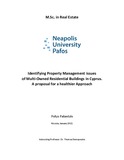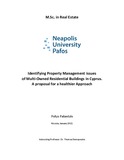| dc.description.abstract | Introduction: An immovable property is, for most people, their biggest and most important asset. However, in Cyprus, efficient property management, particularly in cases of jointly owned buildings is rarely achieved. As a result, an apartment building which is well over 30 years old is generally considered obsolete, and therefore, the value of its units decreases sharply from year to year. This study is set to explore the reasons why Cypriot society appears to be so far behind in this area and define the root of this problematic maintenance.
Data and Methods: A mixed method was used to collect data, such as the assessment of the corresponding legislation and the comparison to the relevant legislations of Greece, UK, and others. Then the study introduces an open survey with 80 participants, and a structured interview with the Director of an established Property Management Company, to gather further data. Finally, and thanks to the database of the Cyprus Bar Association, the data concludes with sixteen [16] court cases regarding lawsuits, for violations of the relevant Cyprus Legislation.
Results: 1) In numerous residential buildings, the Management Committees have issues with unpaid common expenses. This is an issue which becomes even more severe in older buildings. 2) The average amount charged as common expenses to a unit in a standard multi-owned residential building, appears to be adequate to merely cover the operational cost of the building, while in other parts of the world, co-owners keep Reserve Funds for future improvements. 3) Management Committees are often unable to claim unpaid common expenses, due to the slow legal system and/or due to their own lack of professional knowledge and approach.
Conclusion: Multi-storage jointly owned buildings is a relatively new concept in Cyprus reality. Nowadays, with the oldest of those buildings climbing just over 40 years of age, Cypriots are faced for the first time with the increased needs of an aging building, and the significance of property management. Any improvement in this field, will enhance the quality of life of thousands of residents, increase the value of their properties and upgrade the exterior of every residential building, for the benefit of every neighborhood and for the benefit of every city. | en_UK |


